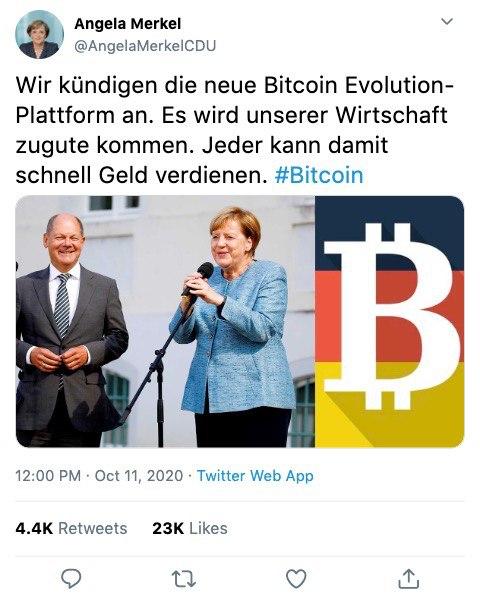An article posing as ZEIT-online reports on a gigantic economic stimulus program by Chancellor Merkel. But be careful, this is a fake!
Chancellor Merkel calls for investing in Bitcoins as part of a new €100 billion plan? That's exactly what a website claiming to be ZEIT-online claims.
This article initially seems like a normal newspaper article. The logo and name of a well-known newspaper can be found there, there is a meaningful headline, but also a very detailed text with supposed sources for this economic stimulus package can be found in the article.
[mk_ad]
The article states that Merkel recommends people invest €225 in an automated trading platform. This investment would ultimately generate multiples of profit.
All in all, visually and in terms of content, it's supposedly a round number and fits, you might think. The problem, however, is that this article and the statements found in it are completely fictitious. The goal of such an article is to lure people into an expensive trap!

Fact check Merkel and the billions
No, Chancellor Merkel does not recommend investing in an automated trading platform. The entire content is pseudo-editorial fake news. The content was created solely to be a convincing lure for a trap on the Internet.
The problem is the supposedly profitable trading platform, which should not bring any profit at all, but rather, based on experience, cheats the participating people out of the entry fee.
And that is exactly the goal of pseudo-editorial content. They are intended to blind people and ultimately convince them to invest in these dubious models. Prominent people who, by the way, have absolutely nothing to do with the article in question are often used as bait.
[mk_ad]
However, it is important for the authors of this content that they invent plausible content that is also relevant to a certain extent and that meets many people's concerns or wishes. This is the case at this point with the fake content with Angela Merkel!
Here a clear reference is made to the economic situation of many people during the corona pandemic and thus a situation of concern is created. As a result, more people tend to believe the content.
This message is even reinforced with supposedly personal statements from the Chancellor. An example should be the Chancellor's tweet, which is shown in the article. The problem: Angela Merkel is not represented on Twitter, she doesn't even have an account. The tweet used in the fake news article is also fake.

In conclusion
This form of deception is not new and we have already reported on it several times (see here or here ). The process of these deceptions is always identical, only the names of the prominent people vary.
There are fake news articles with Thomas Gottschalk, Günther Jauch or, very often, well-known people from the show Die Löwen. Together with SWR and Thomas Gottschalk, we even took a closer look at this method:
Notes:
1) This content reflects the current state of affairs at the time of publication. The reproduction of individual images, screenshots, embeds or video sequences serves to discuss the topic. 2) Individual contributions were created through the use of machine assistance and were carefully checked by the Mimikama editorial team before publication. ( Reason )


